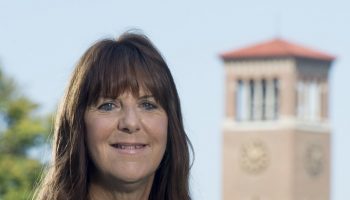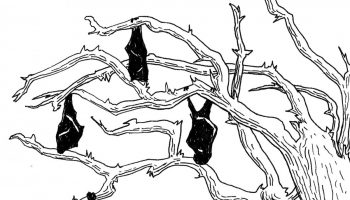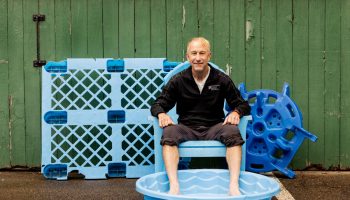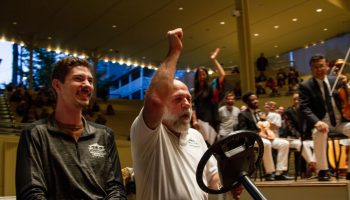Three members of the Chautauqua Institution Board of Trustees are leaving the board after its Aug. 27 meeting, aftera collective 20 years of service to the Institution. Former Board Vice Chairman Tim Renjilian and Class B (property owner) trustee Greg Miller depart after two four-year terms; trustee Karen Arrison is leaving after one term to assume demanding new responsibilities in Buffalo. The three trustees have witnessed some significant changes during their terms and offered some thoughts about what the future may hold for Chautauqua. Renjilian and Miller sat on the former’s porch for our conversation; Arrison joined us by phone.
Please talk briefly about what you do when you are not at Chautauqua, and about your major board responsibilities.
Arrison: I am president of a referral-only design firm. I serve on a number of boards of directors in Buffalo and western New York. For example, I’m vice chair of the Preservation League of New York State. I’m also vice chair of the Western New York Public Broadcasting Association board. On the Chautauqua board of trustees, I was involved in the search for both a new opera director and CSO music director, in addition to committee assignments.
Renjilian: I’m still fully engaged in a career in the healthcare industry. It all centers on regulatory compliance issues. Think about all the hospitals, drug companies, medical device companies that deal with Medicare and Medicaid. My work is around either helping them stay out of trouble in the first place or helping them extricate themselves from difficulties. It may involve devising and installing compliance systems, for example. I may be working with attorneys, regulators, boards of directors, among others. I may work as a consultant.
Miller: I have my own software training company in New York City. We primarily serve large law firms, particularly when they are undergoing convergence or upgrades that require training for attorneys and staff. I’m also a composer and have created a couple of programs that teach music composition. I’m a lifelong Chautauquan, met and married my wife here. We come every summer.
What has stood out for each of you from your years on the board of trustees?
Arrison: I just want to note at the start how important Chautauqua is to me. It’s a sacred grove. The four pillars that are Chautauqua’s foundation are important to me. The arts are important to me, especially mentoring young musicians, some of them rising stars. We’ve been doing that for a long time. Those things are near and dear to my heart. The community is special. I love how much freedom we are able to safely and securely afford to children.
During my time on the board, what has stood out has been change. There has been visible change with the physical plant. We have found replacements for major arts directors and now we are seeking a new president. So change has been significant during my four years on the board. I might say I’m not able to serve eight years because I have been asked to be board chair for public broadcasting for western New York. That’s a big responsibility. If I were asked to return to the Chautauqua board in the future I would certainly consider it.
Renjilian: I was actually a community member of a couple of board-related committees before I came on the board, so my time really extends to about 12 years. Over that time, both the board and the administration have gotten much more sophisticated in terms of how this place actually works. People have seen and heard about the work [fellow trustee] Ron Kilpatrick and others have done on the financial side of things, understanding the financial dynamics of the Institution. When I got started, we were just starting to think about the risks facing us here: risks of natural disasters, financial issues, programming changes, illness or worse to key administration officials. We have gotten far more sophisticated in our understanding of the physical plant. More recently, I’ve focused on the programming side, what draws people here. My whole 12 or so years here have been marked by the search for what makes this place work and work well.
The other big change, for me, is about Chautauqua itself. It’s always been a place people care very passionately about, in all its facets. What we have seen in the last several years is a change in the way that passion plays out. Social media offers enhanced paths to learning, for sure. It also expands ways for people to express their opinions. Part of what is changing, I think, is how we function as a community, talking and listening to each other. We’re still figuring that out in this intense environment.
Tim said he had recently focused on programming. Did you become an IT resource?
Miller: In my work on the audit committee, I did make some contributions there. Given my work, I can speak intelligently on IT and offer some suggestions. When [Institution Director of Information Services Cindy Mando raises issues, and reviews these things with us on the board, I’ve been able to be helpful, I think. I have also been on the program committee with Tim leading the charge, and have stayed close to the gathering of data — an important aspect as we gauge interest and try to anticipate things.
Karen, where have you been able to make the most impact on the board?
Arrison: I have been sort of the flag bearer for the arts. I too have been on the Program Policy Committee — it’s been a wonderful committee to serve on. And I was on the Personnel Committee, where the most important function is to monitor the Institution president’s job performance.
As you three look at the past and look ahead, what do you think is the biggest problem the Institution will face over the next decade?
Miller: My biggest concern is, and has been, affordability. Chautauqua, in a natural process, gets more expensive. This is no insidious plot. It’s the reality that we have a finite amount of properties. Buyers have to have the means to afford this place. But as gate pass prices and local taxes rise, people will get squeezed. Again, I don’t assign blame here. But this is the way it is. We have all been involved in one way or another in finding ways to boost attendance. We are not at full capacity here, so that is a big issue.
Arrison: I think a great deal about the cultural shift. Time has a different meaning for families today. Stays on the grounds are shorter. We need to think holistically about who will populate the grounds. Another issue is how to keep hold of traditions such as the ability to disagree, even on fundamental things, with each other in a civil way. I’m concerned as we look at a coming generation buried in their phones. How do we share the value of being present with others? Because we want them — and everyone — to feel the magic of this place.
Historically, Chautauqua has relied on families over the generations. I hear you saying we need at least to modify that paradigm, to reach people for whom there is no particular family tie. How do we do that?
Arrison: I have been thinking about these things. Look, people can’t be here for the whole season as many used to do. Lots of those nine-week people made lifelong friendships, may have met their spouse here. Remember when one of the key tests for the boy or girlfriend was if they loved Chautauqua? We joke about it, but it was real.
Now, for me it’s about communication. We have to figure out how to communicate with that next generation, if you will. Not sure if I have the answer for that. The way we reach out to people is important. How we inform them about who we are, what we do. As Tim said, how do we get them here and make the relationship stick? How about people in other countries? We have to use the most modern technology to reach people with a product that is profoundly historical.
And there is a gentility here. I think it’s really important that people can let their kids play here with less supervision than virtually anywhere else. How do you make people see that? Communication is key.
Greg, any social media/IT thoughts on these communications questions?
Miller: I think the people doing the social media in the Colonnade are a lot better at it than I am. They’re also a lot younger, which helps. Most of what I have seen from them I have applauded. I think they are on top of things well. I like that they are constantly tweaking the website. Chautauqua has recognized the magnitude of this problem, and the staff is working really hard on it.
As you all look back on your board experience and your Chautauqua experience generally, do you think Chautauquans appreciate what board service involves?
Arrison: Most people now visit Chautauqua for one week. I think they probably care most about what programming they will be exposed to, where will their kids be during the day, can they get a decent meal, and what about accommodations. They’re concerned about the evening entertainment, whether it is the opera or getting ice cream on the plaza. Personally, I don’t think people who come for one week think much about what the board is doing. As long as Chautauqua is running well, that’s what they care about. If they don’t think about the board, that’s completely understandable.
How about longer-term Chautauquans? Were your friends and neighbors surprised at the time you spent for board business?
Arrison: They were mostly surprised at the music director search. That search group was together 20 to 24 hours per week for an entire season. They may not have understood the commitment it took for us to get this right.
Miller: I didn’t know much about the board before I joined. Many people seem to think the board is involved in operational matters such as a malfunctioning streetlight. As I said, I wasn’t sure what to expect when I joined. I know a lot of people here, but not so many board members. What surprised me most pleasantly as I became part of the board was how I have come to cherish my many friendships with other members. Tim, here, for example, teaches a Beatles class with me and my brother. I think Chautauquans may think board members are a different type of person. I can tell you that’s not so.
Renjilian: Part of this is a broader question of seeing individuals versus groups. When we talk to people as individual board members, I think there’s an appreciation for what we do. But when they think of the board as a faceless entity, that’s different. People may not be aware of how often we challenge each other and the administration. There is lots of debate, rigor and integrity. The board can and will do a better job of communicating what we do.
Miller: I recall prior to joining the board, I was outraged to hear that controversial decisions were decided unanimously. But now I know how it works: We often disagree, as Tim says. But by the time we have hammered out what the compromise will be, it is usually something everyone is on board with. It’s not because everyone is blindly following someone’s lead.
Karen, you have the last word.
Arrison: OK. On the board, I really came to appreciate other points of view. Though we often disagreed, we always were united in our desire to see Chautauqua succeed. That was always the most important.






